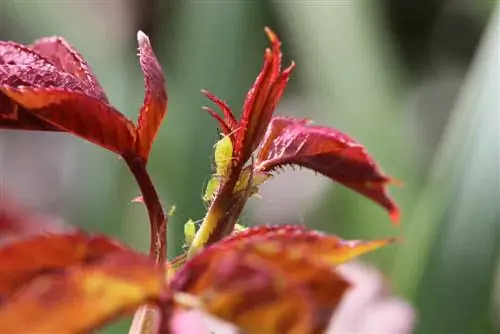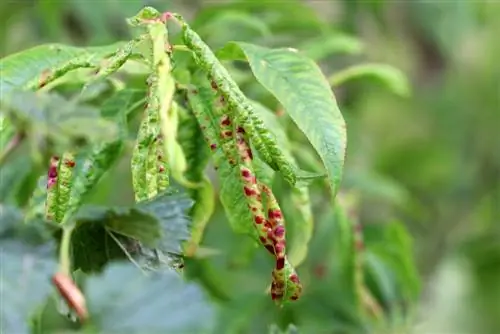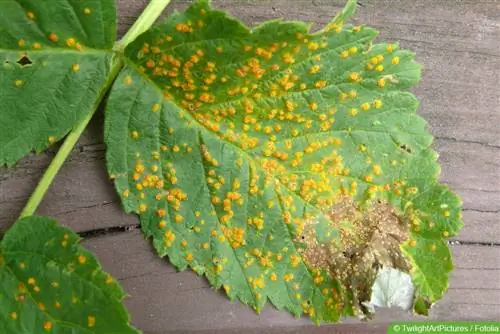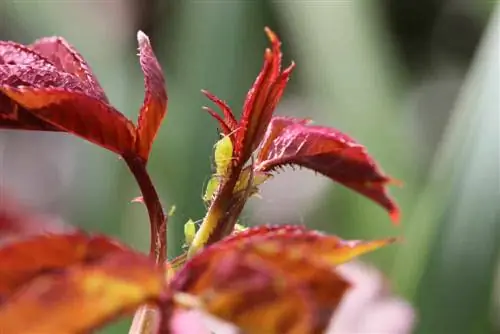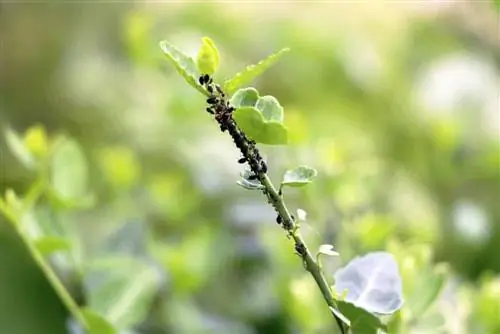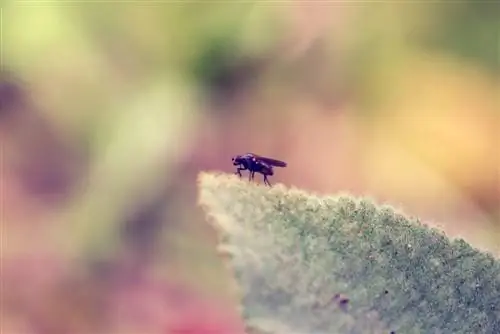- Author admin caroline@plants-knowledge.com.
- Public 2023-12-17 03:39.
- Last modified 2025-01-24 12:45.
No matter whether the aphids are on houseplants, in the greenhouse or on the roses in the garden. If you want to combat them biologically, you need one thing above all: endurance. Aphids can be incredibly stubborn, but you just have to show a little more perseverance. Once you have decided to tackle the pests, you must monitor your plants tirelessly so that you do not miss even a single louse, which can create a new population in a very short time.
Detect infestation
Over 800 different species of aphids occur in Central Europe alone. These include species with green, yellow, reddish, almost transparent and also black, spherical bodies. Although the animals are only a few millimeters long, they can cause great damage to plants. This is especially true if they occur in large numbers. Aphids attack almost every type of plant, whether in the wild, in the home or in the greenhouse.
From spring onwards, the lice hatch from the eggs that have overwintered on the plant. And after just a short time, the pests are sexually mature and in turn produce offspring. All aphid species prefer to accumulate on the young shoot tips and flowers. But they are also often found under the leaves and in the leaf axils. Aphids suck plant juices, which is why infected shoots wither and eventually die. In addition, the pests excrete honeydew as a waste product, which contains sugar and attracts sooty mold fungi, among other insects.
Infestation intensity
Depending on whether the aphid population on the plant is still in its early stages or is already more advanced, other control measures are recommended. In any case, houseplants and potted plants must be isolated so that the parasites do not spread to other plants.
Slight infestation
Once individual aphids are visible on the plant, they can be removed either with water, tweezers or a damp cotton ball. From now on a daily check is necessary.
Medium infestation
Depending on the type of plant and location (room, greenhouse or outdoors), various home remedies are suitable for combating aphids. However, mechanical pre-cleaning is required beforehand.
Severe to very severe infestation
If home remedies are no longer effective against the spread of the pests, it is absolutely necessary to shorten the shoots significantly in order to eliminate the main occurrence of aphids. The cuttings must under no circumstances be thrown into the compost, but must be disposed of with household waste. In addition, a systemic agent or disposal of the affected plant is recommended.
Mechanical cleaning
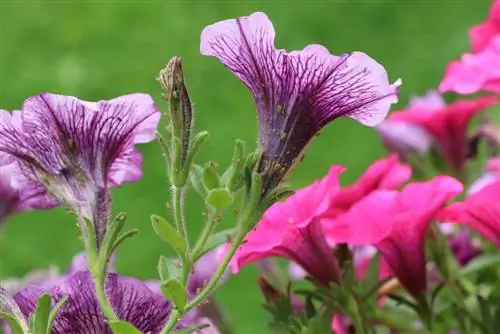
In order for a biological agent to really work effectively, the plant must be mechanically cleaned beforehand. Examine the plant thoroughly to see how strong and where the aphids are.
Houseplants
If you discover aphids on your houseplants, you should not immediately resort to pesticides. The easiest way is to wash the plant with water first.
- Place plant in the shower or bathtub
- Cover the pot with a garbage bag/plastic bag and tie it together at the trunk
- so the potting soil is not washed out
- Rush the leaves and stems from all sides (especially the underside)
- also place the plant on its side
If you don't want to wipe the aphids with your hands, it's best to use a soft toothbrush - especially for removing them from the leaf axils. After spraying, the plant must be isolated from the other houseplants. A slightly cooler, bright room is ideal for this. If this is not possible, place the entire plant in a large clear plastic bag. In this way you increase the humidity locally. Check the plant regularly over the next few days. The offspring of the aphids can hatch from the hidden eggs up to two weeks later and cause a new infestation.
Greenhouse and outdoor plants
The rule also applies to outdoor plants that larger accumulations of aphids should be removed in advance before the plant is sprayed with an appropriate home remedy. Since the plants cannot be dug up and held in the shower, a different method is necessary than for houseplants. It is best to cut off all affected flowers and shoot tips generously and dispose of them in the household waste.
Since the aphids overwinter on the plants, it is advisable to cut back bushes in spring. In this way you remove a large proportion of the eggs, which are preferably located at the tips of the shoots. If an aphid infestation occurs despite all preventative measures, it should be detected as early as possible. Regular checks are therefore essential.
Combat
However, purely mechanical removal of the parasites is far from enough for aphids. Basically, you never really catch all the lice and their eggs and larvae. The use of chemical or systemic agents should only be chosen as a last resort if the sucking pests cannot be de alt with using home remedies. There are a variety of home remedies you can use to combat aphids biologically. Effective home remedies for aphids include:
Soap suds
One remedy has proven particularly useful for effectively combating lice: soap solution. It is best to use curd or soft soap for this. In contrast to normal commercial soap products, pure curd soap and soft soap have the advantage that they are not scented and do not contain any other ingredients that are harmful to the plant.
- 20 g soft soap (potash soap) - corresponds to about 1-2 tablespoons
- alternatively 20 g curd soap (soda soap) - preferably small pieces
- dissolve in a liter of water
The mixture forms a film on the pests so that the aphids can no longer breathe and die relatively quickly.
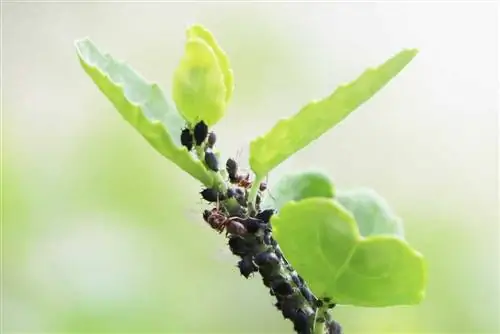
Tip:
The soapy water becomes even more efficient if you add a little spirit (a shot glass full).
Black Tea
The annoying sucking insects can also be effectively eradicated with black tea. To do this, make a tea brew.
- 2 tea bags black tea
- pour a liter of boiling water over it
- let it steep for at least 15 minutes
- let it cool down
Rapeseed oil
The use of cooking oils such as rapeseed oil is also promising in the fight against aphids. The natural oil not only forms a greasy film on the leaves of the plant, making it difficult for the parasites to hold on, but also seals the lice in an airtight manner.
- 1 liter of water
- 80 ml rapeseed oil
- some dishwashing liquid (as an emulsifier)
- mix well
Soapnut shells
The shells of the soapnut (Sapindus mukorossi) have a pest-fighting effect. They contain saponin, which is a natural substance similar to soap. This can be used to produce an inexpensive, non-toxic and odorless remedy against aphids. Soap nuts are available in he alth food stores or good drugstores.
- Crush ten soapnuts
- boil in 1 liter of water
- Let the brew cool down
- Strain solids
Tip:
In addition to the home remedies mentioned above, there are also other home remedies suitable for outdoor plants that are only used to a limited extent in the house because of their strong smell.
Stinging nettle broth
Stinging nettles grow everywhere on the side of the road and often in your own garden. So it's not particularly difficult to get hold of this often overlooked crop. Stinging nettles are not only suitable for fertilizing plants (as manure), but are also an effective home remedy against annoying aphids. The nettle poison kills the aphids. Otherwise, all you need to make nettle stock is a bucket and some water.
- fill half a bucket (10 l) with fresh nettles
- Crushing nettles
- Bucket with
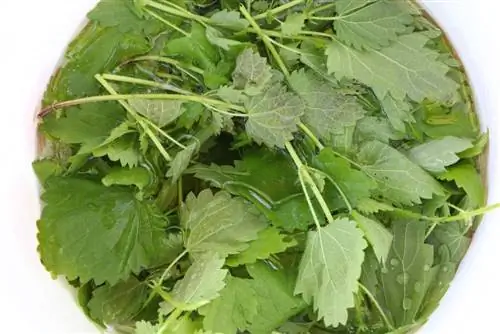
- Fill up water
- Let the brew stand for at least 12 hours
- Strain solids
- use a fine-mesh sieve or an old tea towel
- Collect nettle water
Field horsetail
The effect of field horsetail against aphids is due to its high silica content. The silica strengthens the plant's cells, making it difficult for pests to pierce through the leaf surface and suck the plant sap.
- 100 g fresh field horsetail
- only use the green parts that grow above ground
- alternatively 10 g dried field horsetail
- 1 liter of water
- Soak for 24 hours
Vinegar water
If aphids appear on outdoor plants, we recommend a homemade, non-toxic mixture of household vinegar, water and a little dishwashing liquid. For example, you can use this solution to spray your roses thoroughly from all sides. The mixture consists of:
- 4, 5 liters of water
- 500 ml household vinegar (5% acetic acid)
- about 10 ml dishwashing liquid
- mix well
Lemon
Lemon also works in a similar way to vinegar. To do this, cut the lemons into slices or small pieces and boil them in water. After cooling, sieve the pieces and use the broth as a spray.
- 3 lemons
- 2 liters of water
garlic
If large populations of ants suddenly appear on the plants on the balcony or in the garden, this is usually a clear sign of an aphid infestation. To use garlic effectively as a home remedy against sucking parasites, there are basically two different options:
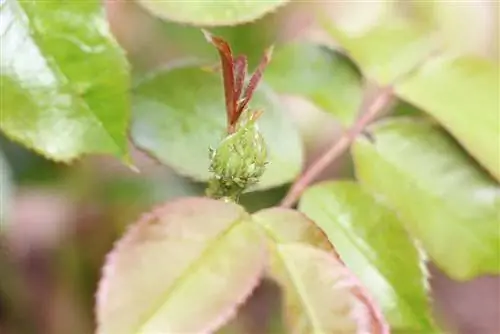
Variant A:
If the infestation is only minor, it is sufficient to stick a peeled garlic clove in the soil next to each plant stem. Half of this should be sticking out of the ground. This allows the garlic to distribute its essential oils through the air around the plant and thus drive away the aphids.
Variant B:
The second variant consists of a garlic decoction that is sprayed onto the affected plant. The production is very easy:
- halve three large cloves of garlic
- place in a liter of water
- let it steep for two weeks
- Pour the broth through a sieve or cloth
Onion stock
If the aphid infestation is not yet very advanced, an onion decoction is also promising.
- cut two large onions into small pieces
- Bring about two liters of water to the boil in a pot
- Let it steep for 30 minutes
- sift the onions after they have cooled
Oregano
Oregano, which we know as an ornamental and spice plant, contains effective substances against aphids. The spray is easy to produce and very environmentally friendly. For the brew you need:
- 100 g fresh oregano
- alternatively 10 g dried spice
- 1 l water
Put the oregano in a pot and scald it with a liter of boiling water. After about 30 minutes you can strain the herbs. After cooling, the cooled oregano broth is diluted three to one with water (three parts water, one part broth) and is then ready to use immediately.
Neem oil
Another effective anti-lice remedy is made with neem oil. Neem oil (neem oil) is available in the drugstore or pharmacy.
- 1 teaspoon neem oil
- 1 liter of water
- a splash of soap as an emulsifier (without perfume and additives)
Potatoes
Lice on roses and in the greenhouse in particular can be easily controlled with potatoes. The cooking water from the nightshade plant contains solanine, which the lice cannot tolerate. However, only use cooled brewing water that does not contain table s alt.
Milk
Fresh milk not only contains bacteria that are effective against fungi, but also many other ingredients such as lecithin, which can be used to combat pests such as aphids.
- one part fresh cow's milk
- two parts water
Application
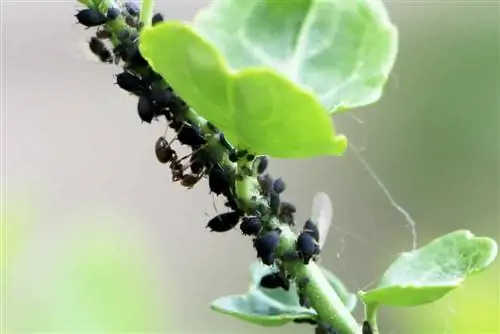
Pour one of the aphid control products mentioned above into a spray bottle and mist all the areas where the sucking pests are located. Don't forget to also wet the undersides of the leaves and the leaf axils.
- Spray plants dripping wet
- Treat several days in a row (at least two to three)
- Repeat procedure after 10 to 14 days
The offspring hatch from the eggs after a week to 14 days. They too must be killed. If follow-up treatment is forgotten, the infestation will suddenly start again after this time. A further check is necessary after every 10 days.
Preventive measures
Aphids prefer to attack weakened plants, which is why it is advisable to cultivate ornamental and useful plants under optimal conditions. The pests can also be repelled using various scents and plant ingredients. These plants are placed between the cultivated plants. The following measures are effective for preventing aphids:
- Ensure sufficient humidity in winter (for houseplants)
- Avoid over-fertilization with nitrogen
- ensure optimal temperature and lighting conditions
- Repot potted plants regularly
- Place savory and lavender between the cultivated plants
Conclusion
Which methods and products are effective against aphids depends primarily on the severity of the infestation. If the infestation is still small to medium, a variety of home remedies can help, which are usually sprayed as a solution or decoction onto all parts of the plant. In this case, persistence and perseverance are required because the plant must be treated intensively and checked regularly for at least two to three weeks.

